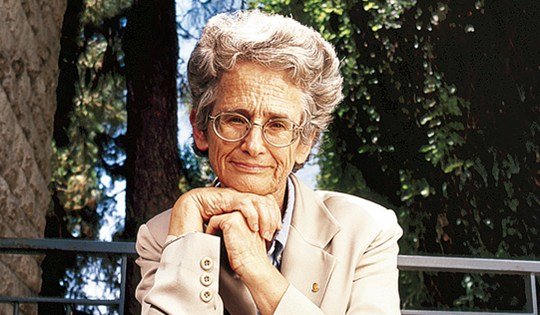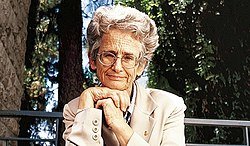Ruth Gavizon: A Pioneer in Human Rights Advocacy and Legal Scholarship
Ruth Gavizon (March 28, 1945 – August 15, 2020) was a prominent figure in the field of law and human rights in Israel. She held the position of professor at the Haim Cohn Chair for Human Rights at the Faculty of Law (Philosophy of Law and Constitutional Law) at the Hebrew University of Jerusalem. Gavizon was one of the founding members and the president of the Association for Civil Rights in Israel, and she also founded and led the Mizilah Center.
In recognition of her contributions to the field, she was awarded the Israel Prize in 2011 for her work in the realm of law. Gavizon was elected as a member of the Israel Academy of Sciences and Humanities in 2015.
Early Life and Education
Ruth Esther Gavizon was born in Jerusalem to a family with deep roots in the city. Her mother, Regina, was the daughter of Rabbi Yosef Mordechai Halevi, the head of the Sephardic community's rabbinical court in Jerusalem, and her father, Moshe, hailed from a family that emigrated from Tetouan, Morocco, in the 19th century. Her uncle, Yaakov Gavizon, served as a judge in the Tel Aviv District Court. Gavizon grew up in Haifa, attended the Reali School, was a member of the Scouts movement in the Shavit branch on Mount Carmel, and later served in the Nahal Brigade kibbutz of Hatzorim.
She studied law, economics, and philosophy at the Hebrew University, where she was an active student and contributed to the first issue of the law journal "Mishpatim," publishing a legal commentary on "Offenses Involving Moral Turpitude as a Disqualification for Public Office." In 1971, she earned an outstanding master's degree in law and later obtained a doctorate in philosophy of law from the University of Oxford in 1975.
Academic and Professional Career
Until October 2010, Gavizon served as a professor at the Haim Cohn Chair for Human Rights at the Hebrew University, holding the position of visiting professor at law schools at Yale University and the University of Southern California.
She joined the Association for Civil Rights in Israel shortly after its establishment and became a central figure within the organization. She served as the chairperson of the association in the 1980s and later as its president from 1996 to 1999. During her tenure, the association filed numerous petitions with the High Court of Justice, particularly on security-related issues, such as the deportation of Hamas activists to Lebanon by the government of Yitzhak Rabin in 1992.
However, criticisms arose, suggesting that the association had become involved in issues beyond its scope. Conversely, some critics argued that Gavizon had distanced herself from her commitment to civil rights, citing various positions she took from the late 1990s onwards. These included her stance on the Kaadan case, where she supported the idea that until there was no legitimate discrimination against Jewish settlements, it should not be applied solely to minorities such as Arabs or ultra-Orthodox Jews.
She also supported restrictions on Palestinian citizenship in Israel and advocated for recognition of same-sex marriages and adoption rights for homosexuals and lesbians through court decisions as a matter of rights.
In 1981, she ran for the Knesset on the Ratz list but was placed 110th and did not secure a seat.
Gavizon was a member of the Jerusalem Institute for Israeli Studies and a senior fellow at the Israel Democracy Institute. She also chaired the academic committee of the Minerva Center for Human Rights in Jerusalem.
She participated in various public committees, including the Cohen Committee on Privacy, the Klugman Committee on Privacy in Public Databases, the Shamgar Committee on the Legal Advisor to the Government, the Zadok Committee on Press Laws, and the Dovrat Committee (from which she resigned, claiming that its conclusions had been predetermined). After the Second Lebanon War in 2006, she was appointed to the Winograd Committee to investigate the events of the war.
In 2003, together with Rabbi Yaakov Medan, she published the Gavizon-Medan Covenant, an attempt to achieve consensus on issues related to religion and state that would be acceptable to both religious and secular Israelis. Notably, the covenant presented detailed proposals in various areas, including the Law of Return, Shabbat, marriage and divorce, burial, religious councils, and more.
The work on the covenant lasted about three years under the auspices of the Shalom Hartman Institute and the Rabin Center for Research in Israel. The covenant was published jointly by the Avichai Foundation and the Israel Democracy Institute.
In 2004, she was appointed by Michael Eitan, chairman of the Knesset's Constitution, Law, and Justice Committee, as a senior advisor to the committee to assist in drafting the Basic Principles of the Constitution.
Controversy and Legal Nomination
Starting from 2004, Gavizon's name was put forward as a candidate for a Supreme Court justice position. However, her nomination was met with strong opposition from then-President of the Supreme Court Aharon Barak. Barak's objections primarily revolved around Gavizon's stance on judges showing restraint and caution in opposition to his own view.
This led to a significant public debate, and in 2005, it turned into a personal battle between then-Minister of Justice Tzipi Livni, who strongly supported Gavizon, and Justice Barak, who publicly opposed her nomination, asserting that she had an "agenda... and this agenda is not suited for the Supreme Court."
In 2005, Gavizon founded the Mizilah Center and served as its leader until her passing. The Mizilah Center was dedicated to promoting a Zionist, Jewish, liberal, and humanistic agenda, advocating for the legitimacy of Israel as a Jewish state committed to democratic and liberal values and the protection of human rights.
Through the Mizilah Center, Gavizon authored several documents, including "A Goal for Israel and Its Implications" (published by the Samuel Neaman Institute for Advanced Studies in Science and Technology) and background papers for the Knesset's Constitution, Law, and Justice Committee during the 16th Knesset on the formation of a constitution for Israel.
The Mizilah Center published position papers on demographic issues, immigration, captivity, and return, and released a book commemorating the 60th anniversary of the Partition Plan.
In 2013, Gavizon was appointed by Minister of Justice Tzipi Livni to examine the constitutional arrangement of Israel as a Jewish and democratic state in the context of drafting the "Nation-State Law" before it was presented to the Knesset. In November 2014, Gavizon recommended against passing the Nation-State Law, and her recommendations, along with detailed background materials, were included in her book titled "Constitutional Anchorage for the Vision of the State?"
In December 2015, she was elected as a member of the Israel National Academy of Sciences and Humanities.
Legacy and Personal Life
Ruth Gavizon passed away on August 15, 2020, leaving behind a son, Doron Gavizon, and two sisters. She resided in the Ramat Denya neighborhood of Jerusalem.
Ruth Gavizon is remembered for her significant contributions to the field of human rights and legal scholarship in Israel. Her work, both in academia and as an advocate for civil rights, has had a lasting impact on the legal and political landscape of Israel. Despite the controversy and debates surrounding her, Gavizon remained committed to her principles and continued to work towards her vision of a Jewish, democratic, and humanistic state. Her legacy lives on through her writings, advocacy, and the organizations she founded, which continue to promote her vision for Israel.
- רות גביזון – ויקיפדיהhe.m.wikipedia.org

